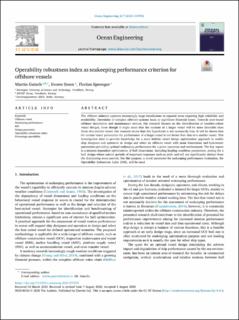Operability robustness index as seakeeping performance criterion for offshore vessels
Peer reviewed, Journal article
Published version

Åpne
Permanent lenke
https://hdl.handle.net/11250/2676601Utgivelsesdato
2020Metadata
Vis full innførselSamlinger
- Institutt for marin teknikk [3431]
- Publikasjoner fra CRIStin - NTNU [38047]
Sammendrag
The offshore industry operates increasingly large installations in exposed areas requiring high reliability and availability. Downtime of complex offshore systems leads to significant financial losses. Towards year-round offshore installation and maintenance service, this research focuses on the identification of weather-robust vessel designs. Even though it might seem that the motions of a larger vessel will be more favorable than those of a smaller vessel, this research shows that this hypothesis is not necessarily true. It will be shown that for certain vessel parameters the performance of a larger vessel is not better than that of a smaller vessel. This investigation aims to provide knowledge for a more holistic vessel design optimization approach to enable ship designers and operators to design and select an offshore vessel with main dimensions and hydrostatic parameters providing optimal seakeeping performance for a given operation and environment. The key aspect is a mission-dependent optimization of hull dimensions, including loading condition parameters, aiming for a hull design where natural periods of important responses such as pitch and roll are significantly distinct from the dominating wave periods. For this purpose, a novel parameter for seakeeping performance evaluation, the Operability Robustness Index (ORI), will be used.
